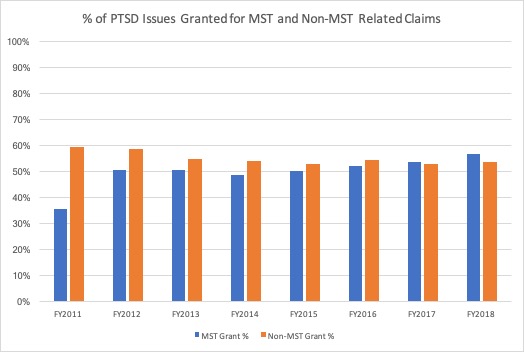VA continues to fail male victims of military sexual trauma

The problem of sexual harassment and assault in the United States military has been widely reported, often — though not always — framed as predominantly women’s issue. However, more than half of survivors are men (though a higher percent of military women are assaulted, the total number of men is higher since men make up 85 percent of the total force).
How do these men fare if they subsequently develop post-traumatic stress disorder (PTSD) as a result of being harassed or assaulted and file a claim with VA? Unfortunately, the data appears to show that they are being systematically discriminated against by the Veterans Benefits Administration (VBA), despite overall improvements to the claims processing system going back several years.
As I wrote while working at VA’s Center for Women Veterans, VBA previously made a number of changes in how it processes PTSD claims related to military sexual trauma (MST). These changes were instituted to reduce stark disparities that had been identified between the rate of claims granted when the cause of PTSD is military sexual trauma compared to other precipitating events, such as combat.
Overall, the effort was largely successful in eliminating the gap: PTSD claims granted for military sexual trauma-related causes climbed twenty points in seven years, from 35.6 percent in fiscal year (FY) 2011 to 56.6 percent in FY 2018, while the rate for non-military sexual trauma causes has hovered around 54 percent for several years.

However, this generally positive trend masks a more complicated and concerning story. When broken down by gender, it becomes clear that these gains have not benefited men and women equally.{mosads}
While both men and women have seen substantial increases in the percent of PTSD claims granted due to military sexual trauma, the grant rate for men has lagged significantly behind, at just 44.7 percent, compared to 57.7 percent for women. This is not to discount the real improvements — the grant rate for men in 2011 was a shockingly-low 26.9 percent, an appalling 33 points behind their grant rate for combat-related PTSD that same year. However, the rate for women who file for disability compensation because they developed PTSD after surviving military sexual trauma has been higher than for any other category reviewed since 2015.
It is glaringly apparent that men’s cases are not being handled equitably.
Why might this be the case? VA’s Inspector General found in 2018 that thousands of military sexual trauma survivors may have been incorrectly denied benefits due to paperwork and procedural mistakes. They made a series of recommendations, including that VBA have specialized raters process military sexual trauma claims, require additional review of denied claims, and develop a checklist for processors to use so they do not skip steps. These are all valid and important steps.{mossecondads}
OIG also recommended that VBA update training for military sexual trauma claims processing and monitor its effectiveness. Given the disparities I identified, I believe this recommendation is fundamentally important and strongly urge VBA to include information specifically about male survivors. Their experiences of sexual assault are different.
RAND research found that men who are sexually assaulted in the military are more likely to have been assaulted multiple times, by multiple offenders, and during duty hours; men are also more likely “to describe an event as hazing or intended to abuse or humiliate them.”
Crucially important for VBA claims processors and raters to know, military men are even less likely than women to either officially report or tell anyone at all about being assaulted.
Lack of knowledge about the large number of men who are sexually assaulted in the military and lack of understanding about their experiences may combine perniciously with implicit bias to drive claims processors and raters to inadvertently treat men’s cases differently.
VBA has previously shown itself capable of acting swiftly and comprehensively to address the overall disparity in military sexual trauma claims. Now it must take those efforts to the next level and ensure men who have survived sexual harassment and assault in the military are not re-victimized when filing claims: they deserve equitable disability compensation from VA.

Members of Congress as well as advocates in the veteran’s community must closely monitor this data over the coming years to ensure rapid improvements are made and that progress is sustained in the long run. Our nation must to a better job supporting those who were assaulted while in uniform; we cannot let them be doubly betrayed by this discrimination.
Kayla Williams is a Senior Fellow and Director of the Military, Veterans, and Society Program at the Center for a New American Security. She previously served two years as Director of the Center for Women Veterans at the Department of Veterans Affairs, serving as primary advisor to the Secretary on policies, programs and legislation affecting women veterans. Prior to that, she worked at the RAND Corporation, where she did research related to veteran health needs and benefits, international security and intelligence policy. She is the author of “Love My Rifle More Than You: Young and Female in the U.S. Army,” a memoir of her deployment to Iraq.
Copyright 2023 Nexstar Media Inc. All rights reserved. This material may not be published, broadcast, rewritten, or redistributed. Regular the hill posts







